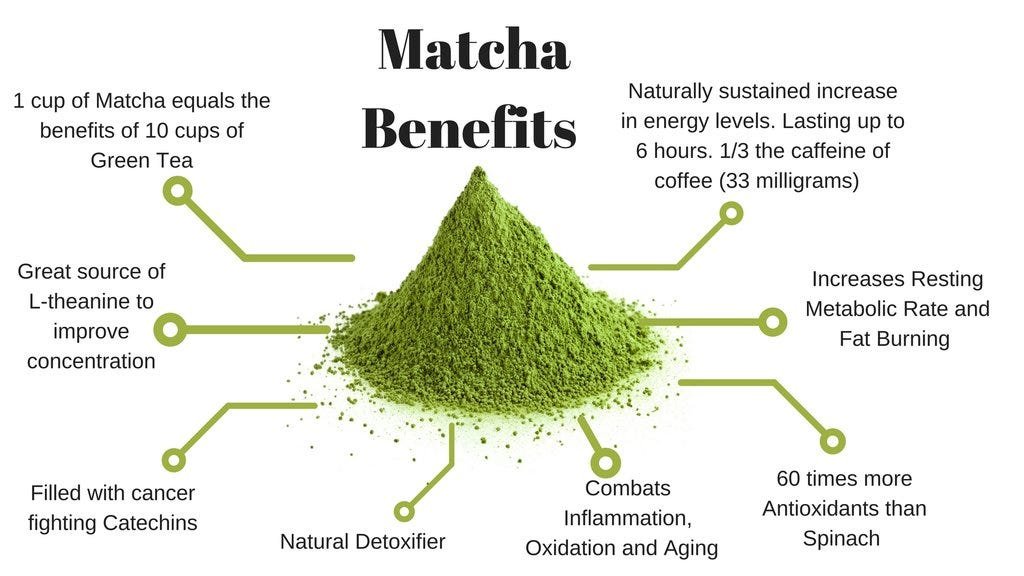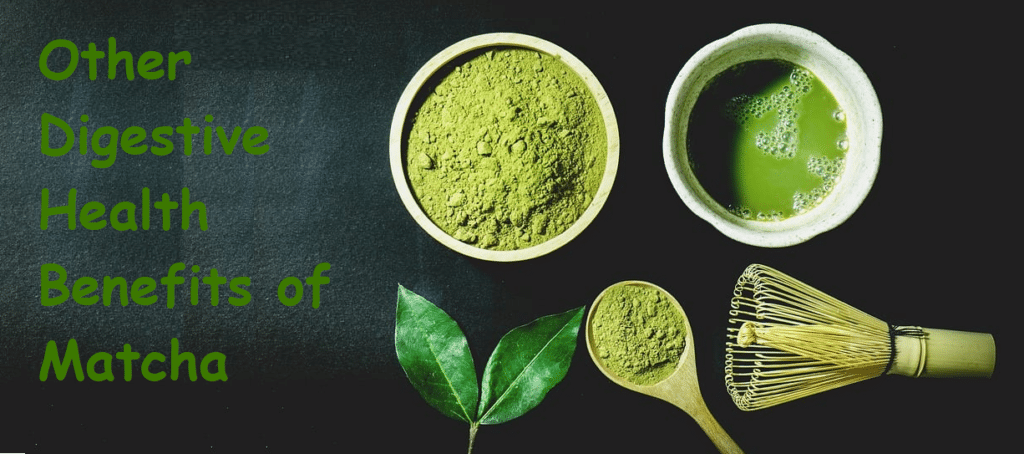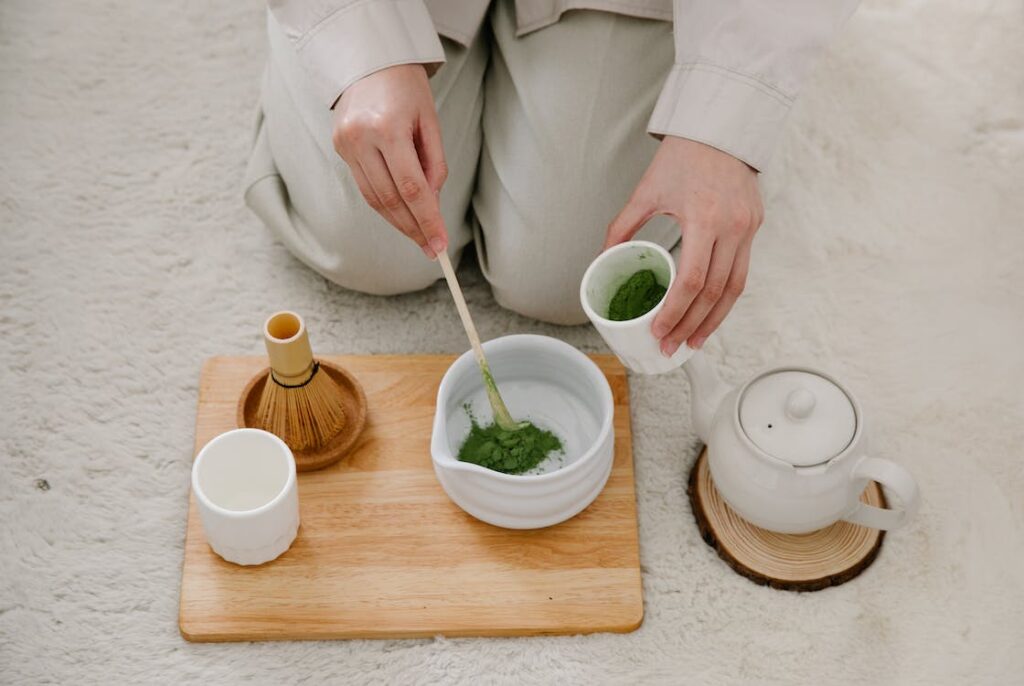Does Matcha Make You Poop? Find Out Why Matcha May Be Better Than Coffee for Gut Health

Matcha green tea has become increasingly popular in recent years, and for good reason. With its vibrant green color and powerful antioxidants, many matcha enthusiasts swear by the health benefits of drinking matcha tea. But one question that often comes up is whether matcha can make you poop. In this article, we will explore the relationship between matcha green tea and digestive health why matcha may be a better choice for gut health than coffee, and also answer the question, does matcha make you poop?
Contents
- 1 Does Matcha Make You Poop? Find Out Why Matcha May Be Better Than Coffee for Gut Health
- 2 What is Matcha?
- 3 The Origins of Matcha Green Tea
- 4 How is Matcha Different from Regular Green Tea?
- 5 Health Benefits of Drinking Matcha Green Tea
- 6 Does Matcha Make You Poop?
- 7 Other Digestive Health Benefits of Matcha
- 8 How to Drink Matcha
- 9 Conclusion
- 10 FAQs
What is Matcha?
Matcha (ma-cha) is a green tea powder that means “powdered tea.” made from leaves used to make matcha powder from the Camelia Sinensis plant, which is the same plant green tea is made from but is grown and processed differently from each other. This tea is a huge part of Japanese culture. To grow matcha, farmers tend to the plants which are grown in the shade for about 3-4 weeks before harvest as they need to produce more chlorophyll, caffeine, and theanine, both of which are essential for matcha.
The Origins of Matcha Green Tea
has a long history that dates back to the Tang Dynasty in China, where powdered matcha green tea powder was first used in Buddhist ceremonies. However, it was in Japan that matcha green tea make became an integral part of the culture and tradition. Matcha green tea was brought to Japan by the Zen monk Eisai in the 12th century and was initially used for medicinal purposes.
Over time, matcha became an important part of Japanese tea ceremonies, where it is still used today. The Japanese tea ceremony, or chanoyu, is a cultural practice that involves the preparation and serving of matcha in a traditional manner, emphasizing harmony, respect, and tranquility. Today, matcha has become popular worldwide, not only for its unique flavor but also for its potential health benefits.
How is Matcha Different from Regular Green Tea?
Matcha and regular green tea come from the same plant, but they are processed differently. Matcha and green tea powder whose leaves are grown in the shade increases their chlorophyll content and gives them a vibrant green color. The leaves are then picked, steamed, and dried before being ground into a fine powder.
Regular green tea leaves, on the other hand, are grown in the sun and are not ground into a powder. Instead, the leaves are steeped in hot water and then discarded just the consumption before.
Health Benefits of Drinking Matcha Green Tea

Matcha green tea is known for its potential health benefits, which are attributed to its high concentration of antioxidants, amino acid l theanine, and other beneficial compounds. Here are some of the potential health benefits of drinking matcha green tea:
Boosts Antioxidant Intake: Matcha tea is a potent source of antioxidants, which are compounds that help protect the body against free radicals and oxidative stress. Matcha contains high levels of catechins, particularly epigallocatechin gallate (EGCG), which is a type of flavonoid that has been linked to numerous health benefits. EGCG has been shown to have potent antioxidant and anti-inflammatory effects, which may help reduce the risk of chronic diseases such as cancer, heart disease, and Alzheimer’s disease.
Promotes Heart Health: Matcha tea may also help the blood vessels and promote heart health by reducing the risk of high blood pressure, high cholesterol, and heart disease. The catechins in matcha have been shown to help lower blood pressure and improve blood lipid levels, which can help reduce the risk of heart disease. In addition, some studies have suggested that drinking matcha may help improve blood flow and reduce the risk of blood clots.
Boosts Immune System: Matcha tea contains a range of compounds that have been shown to help support the immune system. For example, studies have shown that the catechins in matcha may help improve the function of immune cells, which can help protect against infections and illnesses. In addition, matcha contains compounds such as polyphenols and alkaloids, which in other foods, have been shown to have immune-boosting effects.
Promotes Weight Loss: Matcha tea may also be beneficial for weight loss and weight management. The caffeine and catechins in matcha have been shown to help increase metabolism and promote fat burning. In addition, some studies have suggested that drinking matcha may help reduce appetite and increase feelings of fullness, which can help reduce calorie intake, boost metabolism, lose weight, suppress appetite, and support weight loss efforts.
Supports Digestive Health: Drinking matcha tea may also help support the digestive system and gastrointestinal health. Matcha contains compounds that have a mild laxative effect, which can help promote healthy bowel movements and relieve constipation. In addition, the catechins in matcha have been shown to help reduce inflammation in the digestive tract and support the growth of beneficial gut bacteria.
Reduces Stress and Anxiety: Matcha tea contains an amino acid called L-theanine, which has been shown to have calming effects and reduce stress and anxiety. L-theanine works by increasing alpha brain waves, which are associated with more caffeine than relaxation and stress reduction. In addition, some studies have suggested that L-theanine may help improve cognitive function and enhance mood.
Promotes Healthy Skin: Matcha tea may also be beneficial for skin health. The antioxidants in matcha have been shown to help protect the skin against damage from UV radiation and environmental toxins. In addition, the catechins in matcha have been shown to help improve skin elasticity and reduce the appearance of wrinkles and fine lines.
Does Matcha Make You Poop?

The majority of people who drink matcha regularly report that they experience an increase in bowel movements.. While this may sound like a strange benefit, it can actually be a sign of good digestive health. However, it’s important to understand matcha makes the science behind it.
Understanding the Digestive System: When it comes to digestion, the body’s digestive system plays a vital role. The digestive system breaks down food into smaller particles, allowing the body to absorb nutrients and eliminate waste products.
Caffeine Increases Gut Motility: Caffeine, found in both matcha and coffee, can have a stimulant effect on the digestive system, leading to increased gut motility and potentially more frequent bowel movements. However, the caffeine in matcha powder can have the same effect as when you drink coffee but the effect can vary depending on the individual and their caffeine tolerance.
Matcha vs. Coffee: Matcha and coffee have different caffeine content and other nutrients. Matcha has less caffeine than coffee, and it contains L-theanine, which can help to counteract the jitters morning from drinking coffee and provide a more sustained energy boost than morning coffee.
Matcha vs. Regular Green Tea Matcha and regular green tea come from the same plant, but matcha green tea make is processed differently. Matcha is made from ground-up tea leaves that have been shaded before harvest, which gives them a vibrant green color and a higher concentration of antioxidants. Regular green tea is made from steeped tea leaves and has a lower concentration of antioxidants.
Excessive Consumption of Matcha: Consuming too much matcha or any other caffeinated drinks can lead to negative effects, such as increased heart rate, anxiety, and disrupted sleep patterns. Additionally, excessive consumption of matcha or green tea can cause greenish stools due to the high chlorophyll content. However, this is generally not a cause for concern and should normalize with reduced intake.
Other Digestive Health Benefits of Matcha

Relieves Constipation Matcha can help to relieve constipation by stimulating bowel movements. This is due to its caffeine content, which acts as a natural laxative.
Improves Gastrointestinal Health: Matcha contains antioxidants that can help to protect the gastrointestinal tract from damage caused by free radicals. Additionally, the catechins in matcha have been shown to reduce inflammation in the gut, which can help to improve overall digestive health.
Suppresses Appetite: Drinking matcha can help to suppress appetite, making it a great option for those looking to manage their weight. This is because matcha contains a compound called EGCG, which has been shown to reduce hunger and increase feelings of fullness.
More Bowel Movements: As mentioned earlier, the caffeine in matcha can stimulate bowel movements, leading to more frequent trips to the bathroom. However, excessive caffeine consumption can have negative effects on the digestive system, so it’s important to consume matcha in moderation and not rely on it as a sole means of relieving constipation or increasing bowel movements.
How to Drink Matcha

Matcha can be consumed in various ways, including as a traditional tea, latte, or added to smoothies. Here are some popular methods:
Ceremonial Grade Matcha: For a traditional matcha experience, use ceremonial grade matcha. Add 1-2 teaspoons of matcha powder to a bowl, pour in hot (but not boiling) water, and whisk until frothy. Enjoy the tea in small sips.
Matcha Latte: For a creamy and sweet version of matcha, try a matcha latte. Heat milk (dairy or non-dairy) in a pan, and add sweetener (such as honey or maple syrup) and matcha powder. Whisk together and pour into a cup.
Matcha Powder: Matcha powder can also be added to smoothies, yogurt, or oatmeal to increase the nutrient content of your meal.
Conclusion
In conclusion, matcha tea can be a great alternative to coffee for your morning cup. Both beverages come from the antioxidant family, providing a variety of health benefits. While coffee has higher caffeine content, matcha tea offers a more sustained energy boost with a unique combination of caffeine and the amino acid L-theanine. Overall, choosing between coffee and matcha tea may come down to personal preference and individual health needs.
FAQs
Is matcha safe to drink every day?
Yes, matcha is safe to drink every day in moderation. However, excessive consumption may lead to negative side effects such as jitteriness and digestive issues.
Is ceremonial grade matcha worth the extra cost?
Ceremonial-grade matcha is typical of higher quality and has a more delicate taste than culinary-grade matcha. Whether it is worth the extra cost depends on personal preference and intended use.
Can matcha help with weight loss?
Matcha has been shown to boost metabolism and suppress appetite, making it a potentially useful tool for losing weight. However, it is not a miracle weight loss solution and should be consumed as part of a healthy diet and lifestyle.
Does Matcha Make You Poop Green?
This is another commonly asked question by many matcha enthusiasts across the globe. Yes, matcha green tea does turn your poop green, but only when consumed inlarge quantities.
Can drinking too much matcha in the morning have negative effects on my digestion?
It is possible to experience negative effects from consuming too much matcha, as excessive caffeine consumption can irritate the digestive tract and lead to loose stools. It is best to listen to your body and adjust your matcha intake accordingly.